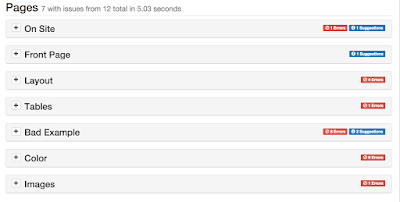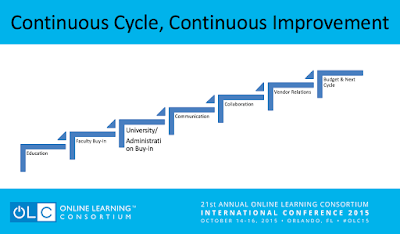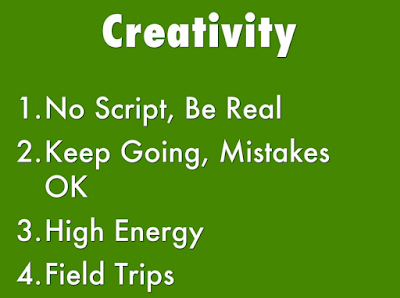I think the best way to describe the conference is “immense”. There were over four hundred informational sessions (probably around twenty-five or thirty per session), along with dozens of discovery sessions happening in the vendor hall. I found that I was torn between five or six extremely appealing options every session.
Admittedly, I tend to be attracted to sessions that deal with emerging technologies, but there was something for everyone at this conference. The OLC conference is aimed at Instructional Designers, Distance Learning Directors, and faculty. While there were a few sessions dedicated to policy and administration, I think most of the sessions were a solid “where the rubber meets the road” mentality. I would strenuously recommend attending this conference in the future for faculty and staff that like to keep their thumbs on the pulse of higher ed and emerging technology.
A few of the sustained themes offered throughout the conference were open educational resources (OER), meaningful discussion forums, and gamification (although the trend seems to be avoiding “gamification” as a moniker and instead leveraging game dynamics in the classroom). Although all three of these have been on the radar of educators, it was refreshing to see multiple examples of how they are being implemented in online learning. Given the immensity of the conference, it was easy for attendees to gain multiple perspectives and implementation ideas for any particular technology.
FAVORITE SESSIONS
The presenters were high caliber at OLC. Most of the presentations were a happy mix of theoretical framework and practical take-aways. The following highlight four of my favorite presentations. Note that the links will take you to the specific page at the OLC website that provides not only an abstract, but a link to the PowerPoint or PDF resources. A comprehensive list of the sessions can be found at the OLC conference website.UODIT, No, You Do It: How I Learned to Stop Worrying and Love Accessibility by John Raible and Nancy Swenson from the University of Central Florida
- This work won an Effective Practice award, and deservedly so. UCF designed an add-on to their LMS, Canvas, that will walk through an entire course and check the content for accessibility. As far as I know, this is the most comprehensive solution I’ve seen to the accessibility problem that is plaguing higher education. UDOIT will provide a report that shows the faculty (or course designer) all the issues in the course, and provide them with ideas of ways to fix them. The best part is that the user does not need to go to each piece of content individually - they can remedy all the issues from one screen. Unfortunately, this software is only available in Canvas (although they published the code as open source, so hopefully someone will adapt it to Blackboard and Moodle).
 |
| Screenshot showing accessibility issues |
How Game Dynamics (not Gamification) Will Save Higher Education by Kevin Bell from Northeastern University
- Engaging and practical, this talk provided the participants with a fundamental understanding of some basic game dynamics as well as pathways and examples to introduce them into the classroom. The slideshow in the conference notes is good, but does not accurately reflect the potency of game dynamics. If this talk becomes available as a video (or if you have the opportunity to see Kevin Bell present), take advantage of it.
 |
| Games allow players to achieve a skill and then practice with it before taking on another challenge |
Opening Up Opportunities for Students and Faculty: A University Transitions to Open and Digital Resources by Jill Buban from OLC
- Jill outlined the process she used to provide affordable alternatives to textbooks and course material that best meet the course and program outcomes. The process changed the OER strategy of the institution, and in one year went from only 18 courses to 324.
 |
| A continuous cycle for OER adoption |
Get Ready for Your Close-up: Strategies for Creating Awesome Instructional Videos by Karen Costa from Southern New Hampshire University
- Karen shared an incredible wealth of information for making videos. From software to storyboarding to sharing platforms to scripts, her talk was loaded with helpful, practical tips. There was a lot of participation from people in the room, offering up tips and software they found helpful. This talk was very engaging, and a great starting point for anyone who makes instructional videos.
 |
| Karen's nomenclature is awesome |
NOTABLE AWARDS
There were a few standout concepts and exemplary practices that were given prestigious awards this year. The “Best in Track” list is published on the OLC website, and offers links and abstracts to amazing presentations in each track.
This year, Alex Pickett assisted OLC in an effort to provide the first ever “Spanish Presentation per Concurrent Session”! This year also saw a devoted track to Historically Black Colleges and Universities.
Open SUNY COTE was presented with an Effective Practice award for OSCQR. The presentation that Kim Scalzo and Dave Ghidiu gave was an overview of Open SUNY and COTE, followed by a live demo of the OSCQR Rubric and Dashboard.
 |
| Shiny |
CONCLUSION
You should totally plan on attending next year! The conference really has something for everyone in distance learning. It’s a great look at new tools, applicable implementations, and practical guides.
Plus, it’s in Florida - although I did not get out much because the conference is stacked with opportunities to network and learn. By the way, I ate the absolute best hamburger of my life while at the Swan and Dolphin. There’s a restaurant called “The Fountain”, and (in addition to the ice cream stand there) the Fountain Signature Burger was out of this world. I’m not even joking.
Mark your calendars for November 16-18, 2016 at the Swan and Dolphin Resort in Orlando. And if you run into any members of the planning team, be sure to congratulate them on a phenomenal job with the conference.






This comment has been removed by a blog administrator.
ReplyDeleteThis comment has been removed by a blog administrator.
ReplyDelete